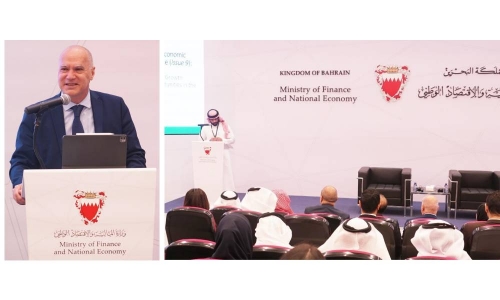The move away from oil not threat but a tremendous opportunity: Bahrain
TDT | Manama
The Daily Tribune – www.newsofbahrain.com
Reported by Zahra Ayaz
Bahrain's potential in utilising hydrogen as the world accelerates away from fossil fuels to a greener future enjoyed the focus of the ‘Gulf Economic Update’ which also viewed the change as a “tremendous opportunity” to diversify GCC economies.
The world moving away from fossil fuels towards greener energy should not be construed as a threat but a tremendous opportunity, speakers viewed at a review of the ‘Gulf Economic Update’ held in cooperation between the World Bank and the Ministry of Finance and National Economy yesterday.
The seminar also pointed out that this direction is in line with the GCC country vision that outlines a future that relies increasingly on the private sector playing a leading role in investment, job creation and value addition. The focus was also on the most recent economic changes in the GCC, emphasising the post-pandemic recovery and a more favourable oil market.
Mr. Issam Abousleiman, a Regional Director of GGC countries, said, “We are projecting 6.9% growth this year, and it will moderate to 3.7% in 2023.” “Bahrain’s economic outlook hangs on oil market prospects and the government’s commitment to the reform agenda.
“Growth is expected to accelerate to 3.8% in 2022, mainly driven by the non-hydrocarbon sector, which is expected to exceed 4% growth, supported by the full reopening of the economy and a stronger manufacturing sector,” he added.
“Higher oil prices and resuming spending restraints under FBP are expected to significantly narrow the fiscal deficit to less than 4% of GDP in 2022. The current account balance, which recorded its first surplus in seven years in 2021, is forecasted to improve markedly to reach 11.3% of GDP in 2022 and remain in surplus over the medium term.”
Mr. Khaled Alhmoud, a Senior Economist at World Bank, and Mr. Ismail Radwan, the Lead Country Economist at World Bank, presented the Gulf Economic Update reports. The report highlighted key challenges facing the GCC countries, hoping to stimulate debate among policymakers on how best to confront these challenges.
“The oil industry became the main engine of the economy in the first half of 2022. A strong recovery in 2021 led to an increase in the region’s inflation rate, which peaked in 2021 at about 2.1%. “The inflation rate continued to rise in the first half of 2022 due to the war in Ukraine and its effects on increasing food and energy prices, but despite this, it still remained far lower than that of other nations.”
Less expensive
“Fossil Fuel is more expensive now, while renewable energy is 30pc less expensive. This would help grow the economic sector in a renewable way by 2030. “The focus is not on climate change but on how Bahrain can create green energy for long-term development, and in the meantime, clean hydrogen is used.
“Changing their economy to green will allow them to export their oil and gas while producing a lot of solar energy. Bahrain has the capital to use hydrogen energy.”
Related Posts

